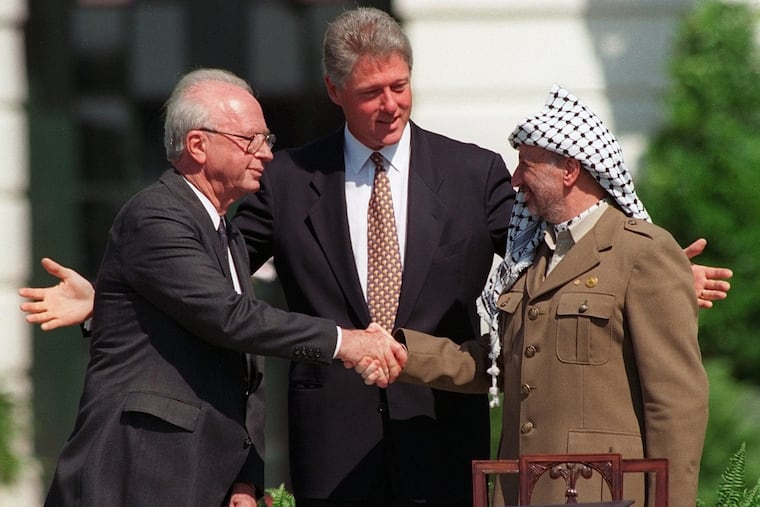The danger of a single story about Israel-Palestine
Both Israelis and Palestinians have suffered deep historical traumas. But if we only tell one of their stories — and deny the other one — we will scream past each other.

In 2009, the Nigerian author Chimamanda Ngozi Adichie gave a TED Talk on the “danger of a single story.” Exploring the myths she heard about Africa as a child, she warned against embracing simplistic narratives about the continent — an enormously diverse place — or anywhere else. The speech went viral, becoming one of the most popular TED Talks in history. It has been viewed over 35 million times.
We need to watch it one more time, with an eye to the most divisive question on American campuses right now: Israel-Palestine. And if we’re honest, we’ll admit that there’s no single story about that, either.
The Israeli narrative describes the triumphal birth of a new state in 1948, following the murder of six million Jews in the Holocaust. The Palestinian narrative calls the same event the nakba, or catastrophe, which displaced half of the Arabs living in Palestine from their homes and communities.
The Israeli narrative celebrates the Six-Day War of 1967 as the heroic defeat of three Arab armies bent on its destruction. To Palestinians, by contrast, it marks the start of Israel’s military occupation of the West Bank and Gaza.
Israel blames Yasir Arafat and the Palestine Liberation Organization for the violence that enveloped the region during the “Second Intifada” of the early 2000s. Palestinians blame Ariel Sharon and his provocative visit to the Temple Mount in Jerusalem, one of the holiest Muslim sites. And so on.
Guess what? They’re both right.
Both of these peoples have suffered deep historical traumas. Both of them have legitimate claims to land, dignity, and self-determination. But if we only tell one of their stories — and deny the other one — we will scream past each other. And we won’t learn much of anything.
That’s precisely what happened last fall at most American colleges and universities, following the Oct. 7 Hamas attack on Israel. Students on both sides of the divide released statements and staged protests, but there was almost no meaningful conversation between them. What’s there to talk about, really, when you know you’re right?
Pro-Israel groups urged universities to shut down chapters of Students for Justice in Palestine, which has called Israel an apartheid state. The critics of SJP don’t want to debate that proposition; instead, they want to ensure that no such discussion takes place.
Many pro-Palestine students don’t want the debate, either. A University of Maryland student said he would “stay away from dialogues that seek to paint the two sides as equal” because “we see this relationship as a colonized/colonizer relationship. It’s not two equal sides beefing it out.”
The student refused to give his full name, fearing that he’d be doxxed or blacklisted. Likewise, some Jewish students involved in the issue have declined to identify themselves. And that, too, speaks volumes about the low quality of conversation on our campuses. Even as we shout past each other, we’re afraid of being shouted down ourselves.
That’s why universities need to sponsor structured dialogues about Israel-Palestine, as our students return to campus from their winter break. Some students won’t want to talk, of course. But we can’t let them dictate the tone for everyone else.
And we’ve got a great model in Dartmouth College, where professors from Jewish and Middle Eastern studies led several forums last fall. The goal was to present both the Israeli and the Palestinian perspectives, not just one or the other.
“We wanted to explain to the students that we can’t be reductionist, we have to think in complexity, that this is not a single narrative,” one of the professors said. “You can condemn, but you also have to understand.”
At the first Dartmouth meeting, 600 people joined by livestream; the next forum drew 1,300 listeners, at a college of fewer than 5,000 undergraduates. Even as campus bullies try to block dialogue and understanding, many students are hungry for it. And the only way we can teach them is by presenting multiple stories.
That brings us back to Adichie, who warned us about the danger of a single one. To move beyond our current impasse, we need to acknowledge the contrasting narratives about Israel-Palestine. And we need to resist the loudest voices — on both sides — who want to prevent a real discussion of them.